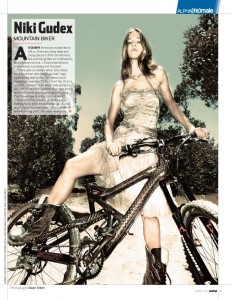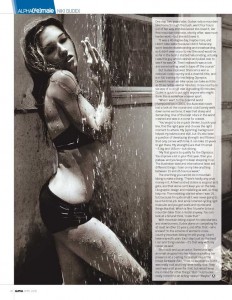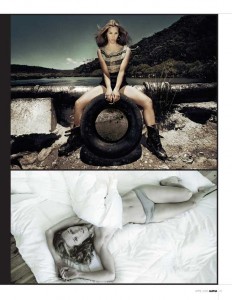 Niki Gudex
Niki Gudex
Mountain biker and conveniently good-looking with it. Interviewed for Alpha magazine in about 2006. The photographer is Dean Tirkot.
_______
AS GUSHY American movies like to tell us, there are many ways and many places to find commitment. But practising flips on a trampoline at snowboard school, 1.5 seconds before a broken back, is probably not the best.
“There was a moment when [the class] were uncertain who would go next,” says Sydneysider Niki Gudex. “So I went and it happened. I was like, ‘I’ll do a front flip, I’ll do a backflip…’ I wasn’t sure what I was going to do. I didn’t make the decision. But I was young and that’s what you do when you’re young. That’s how I learnt about commitment.”
So ended that chapter of Gudex’s life: training to be a pro snowboarder at 18, now, at 27, a pro mountain biker. “That put me off snowboarding a lot,” she says reasonably.
One day, two years later, Gudex rode a mountain bike home through the bush, went four hours out of her way and discovered she loved it.
Her first mountain bike race, shortly after, was much harder work but she still loved it. “It was a 40-degree day, maybe more, and I didn’t take water because I didn’t follow any sport besides skateboarding and snowboarding, so it didn’t even occur to me [the race] would be so far in the bush. I started hallucinating, actually. I saw this guy who’d crashed and pulled over to see if he was OK. Then I realised it was a rock and some bunting used to tape off the course.”
 But Gudex improved. She’s since won a national cross-country and a downhill title, and is in full training for the Beijing Olympics. Downhill mountain-bike races can take as little as three helter-skelter minutes; cross-country is six laps of a circuit over a gruelling 90 minutes. Gudex is quick to put right anyone who might think this is somehow a lesser sport.
But Gudex improved. She’s since won a national cross-country and a downhill title, and is in full training for the Beijing Olympics. Downhill mountain-bike races can take as little as three helter-skelter minutes; cross-country is six laps of a circuit over a gruelling 90 minutes. Gudex is quick to put right anyone who might think this is somehow a lesser sport.
“When I went to the downhill world championships in 2001, the Australian team had a look at the course and could barely walk down some sections, it was that steep and demanding. One of the best riders in the world crashed and was in a coma for a week.
“You’ve got to be a quick thinker, to pick your line, find the right gear and choose the right moment to attack. My [sporting] background helped my balance and skill, but it’s also been a question of developing strength and fitness that only comes with time. It can take 10 years to get there. My strengths are that I’m small 51kg and 165cm but strong.
“My first goal is to qualify for the Olympics. You improve a lot in your first year, then you plateau and you’ve got to keep stepping it up. The Australian level and international level are different things. I train on my bike anything between 15 and 25 hours a week.”
The one thing you cannot do in mountain biking is make a living. “There’s hardly any prize money in it. A few hundred dollars is as good as it gets, and that alone can’t keep you on the bike. I do graphic design and modelling as well, so they help me. The modelling started when I was 16, but because I’m quite small it was never going to be a full-time job. And since I started cycling I got muscular and you get scars and injuries and things like that. Which is fi ne: I’d prefer to be a mountain biker than a model anyway. You can look at a hill and think, ‘I rode that.’”
 With mountain biking a sport for late-starters and slow-burners, Gudex plans on competing for at least another 10 years, and after that who knows? “In the scheme of women’s cross- country mountain biking I’m still young. I don’t have a specific plan. Each day I just do the best I can and things evolve it’s that way with my career as well.”
With mountain biking a sport for late-starters and slow-burners, Gudex plans on competing for at least another 10 years, and after that who knows? “In the scheme of women’s cross- country mountain biking I’m still young. I don’t have a specific plan. Each day I just do the best I can and things evolve it’s that way with my career as well.”
She could end up an actor. Some time ago an email dropped into her inbox requesting her presence at a casting for a small role in the movie Fantastic Four. “I had no experience, but it was really cool and they were really nice. They said I was a bit green for that, but would keep me in mind for other things.” But could Gudex really commit to an acting career? “Maybe.”
________
See this as PDFs: